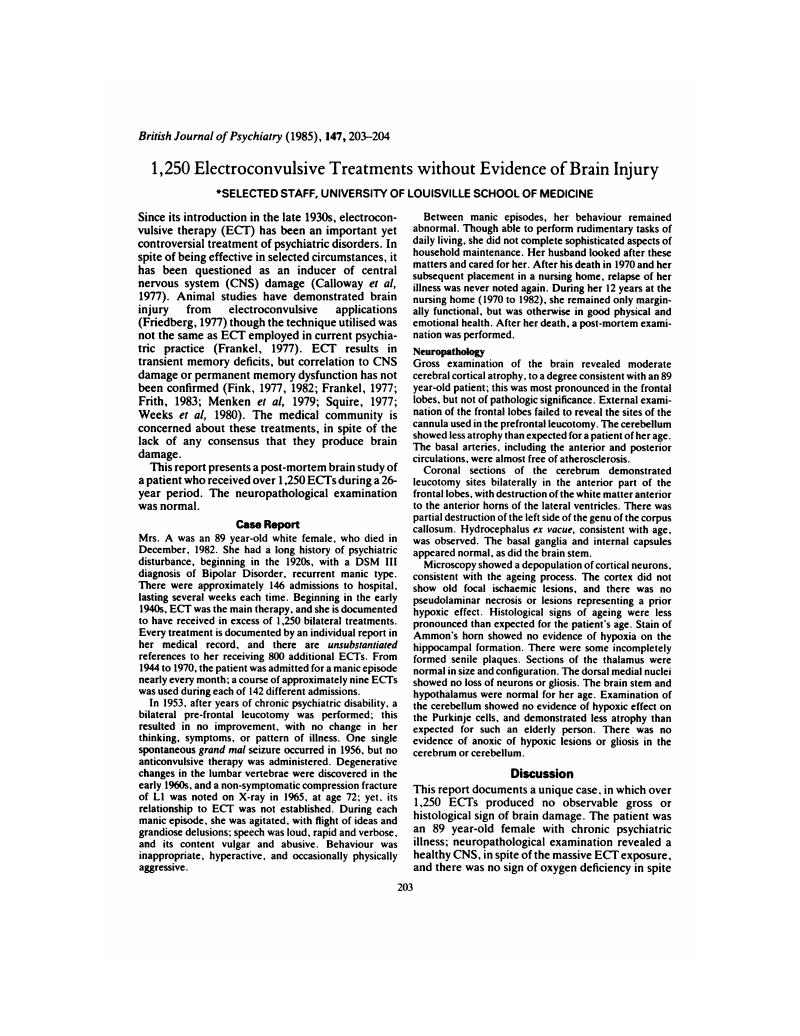Crossref Citations
This article has been cited by the following publications. This list is generated based on data provided by Crossref.
Lesser, R. P.
Luders, H.
Wyllie, E.
Dinner, D. S.
and
III, H. H. Morris
1986.
Mental Deterioration in Epilepsy.
Epilepsia,
Vol. 27,
Issue. s2,
Mander, A. J.
Whitfield, A.
Kean, D. M.
Smith, M. A.
Douglas, R. H. B.
and
Kendell, R. E.
1987.
Cerebral and Brain Stem Changes After ECT Revealed by Nuclear Magnetic Resonance Imaging.
British Journal of Psychiatry,
Vol. 151,
Issue. 1,
p.
69.
Benbow, Susan M.
1989.
The Role of Electroconvulsive Therapy in the Treatment of Depressive Illness in Old Age.
British Journal of Psychiatry,
Vol. 155,
Issue. 2,
p.
147.
Bergsholm, P.
Larsen, J. L.
Rosendahl, K.
and
Holsten, F.
1989.
Electroconvulsive therapy and cerebral computed tomography.
Acta Psychiatrica Scandinavica,
Vol. 80,
Issue. 6,
p.
566.
Durham, James
1989.
Sources of Public Prejudice against Electro-Convulsive Therapy.
Australian & New Zealand Journal of Psychiatry,
Vol. 23,
Issue. 4,
p.
453.
Scott, Allan I. F.
Weeks, David J.
and
Mcdonald, Claire F.
1991.
Continuation Electroconvulsive Therapy: Preliminary Guidelines and an Illustrative Case Report.
British Journal of Psychiatry,
Vol. 159,
Issue. 6,
p.
867.
Tomasson, Kristinn
Winokur, George
and
Pfohl, Bruce
1992.
Failed and short seizures associated with prior electroconvulsive therapy.
European Archives of Psychiatry and Clinical Neuroscience,
Vol. 241,
Issue. 5,
p.
307.
Strömgren, L. Sand
1992.
Biologische Psychiatrie.
p.
97.
Swartz, Conrad Melton
1993.
Seizure Benefit: Grand Mal or Grand Bene?.
Neurologic Clinics,
Vol. 11,
Issue. 1,
p.
151.
1994.
Does ECT alter brain structure?.
American Journal of Psychiatry,
Vol. 151,
Issue. 7,
p.
957.
Berrouschot, Jörg
Rolle, Kathrin
Kühn, Hans-Jürgen
and
Schneider, Dietmar
1997.
Serum neuron-specific enolase levels do not increase after electroconvulsive therapy.
Journal of the Neurological Sciences,
Vol. 150,
Issue. 2,
p.
173.
Rabheru, Kiran
and
Persad, Emmanuel
1997.
A Review of Continuation and Maintenance Electroconvulsive Therapy.
The Canadian Journal of Psychiatry,
Vol. 42,
Issue. 5,
p.
476.
Wilkinson, David
and
Daoud, Janet
1998.
The stigma and the enigma of ECT.
International Journal of Geriatric Psychiatry,
Vol. 13,
Issue. 12,
p.
833.
Zachrisson, Olof C.G.
Balldin, Jan
Ekman, Rolf
Naesh, Ole
Rosengren, Lars
Ågren, Hans
and
Blennow, Kaj
2000.
No evident neuronal damage after electroconvulsive therapy.
Psychiatry Research,
Vol. 96,
Issue. 2,
p.
157.
2000.
The Practice of Electroconvulsive Therapy.
p.
247.
Schott, K.
Birk, L.
and
Batra, A.
2001.
Die therapeutische Vielfalt in der Depressionsbehandlung.
p.
65.
Weinstein, Steven
2001.
The anticonvulsant effect of electrical fields.
Current Neurology and Neuroscience Reports,
Vol. 1,
Issue. 2,
p.
155.
Pascual-Aranda, Ana
Garcia-Morales, Irene
and
Sanz-Fuentenebro, Javier
2001.
Postictal Psychosis: Resolution after Electroconvulsive Therapy.
Epilepsy & Behavior,
Vol. 2,
Issue. 4,
p.
363.
Giles, James
2002.
Electroconvulsive Therapy and the Fear of Deviance.
Journal for the Theory of Social Behaviour,
Vol. 32,
Issue. 1,
p.
61.
Das, Arunava
and
Chiu, Edmond
2002.
Electroconvulsive Therapy: Issues in the Elderly.
Psychogeriatrics,
Vol. 2,
Issue. 4,
p.
245.




eLetters
No eLetters have been published for this article.